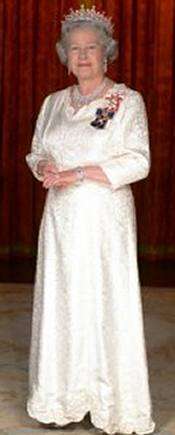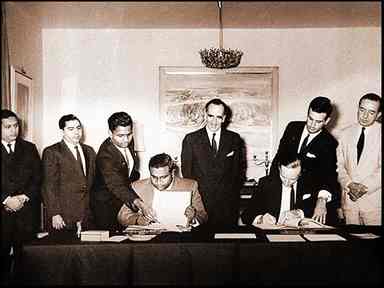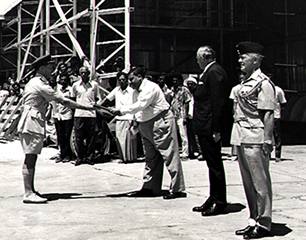"Today's
Commonwealth is a world away from the handful of British
Dominions which were the first Commonwealth members. It
is a unique family of 54 developed and developing nations,
a voluntary association of independent sovereign states
spread over every continent and ocean. From Africa to Asia,
from Pacific shores to the Caribbean, the Commonwealth's
1.7 billion people make up 30% of the world's population
and are of many faiths, races, languages and cultures.
"The
modern Commonwealth gradually evolved out of United Kingdom's
imperial past, mainly through decolonisation, the effects
of two world wars and changing patterns of international
relations. Today it helps to advance democracy, human rights
and sustainable economic and social development within its
member countries and beyond. With a common working language
and similar systems of law, public administration and education,
the Commonwealth has built on its shared history to become
a vibrant and growing association of states in tune with
the modern world."
-Extracted
from the website of the Commonwealth Secretariat
|
The
Sun Never Sets
 The
Commonwealth may be "a voluntary association
of independent sovereign states". Nevertheless
all members are not equal in terms of membership rights.
The Head of the Commonwealth is always the head of
state of the United Kingdom and other countries, such
as New Zealand, that share the head of state of the
United Kingdom. The
Commonwealth may be "a voluntary association
of independent sovereign states". Nevertheless
all members are not equal in terms of membership rights.
The Head of the Commonwealth is always the head of
state of the United Kingdom and other countries, such
as New Zealand, that share the head of state of the
United Kingdom.
This
in spite of the fact that there are traditional rulers
in other countries of the Commonwealth. Examples of
such countries are Malaysia, Brunei Dar es-Salaam,
Swaziland, Lesotho, Tonga and Samoa.
In
all other international associations of states there
are systems of rostering the presidency among member
states.
|
|


|
The
Maldives regained control of its external relations from Great Britain
in 1965. This event was called independence. Upon gaining independence,
His Majesty the Sultan's Government headed by the Prime Minister
Ibrahim Nasir Rannabandeyri Kilegefan (N.G.I.V) declined to be part
of the British Commonwealth of Nations because the Prime Minister
considered it beneath the dignity of the Maldive Kingdom.
It
was only in 1982 that the Maldives applied for and was granted membership
of the British Commonwealth of Nations. That was during the tenure
of the regime that is still in power in Malé, since 1978.
As
a consequence, today, Her Majesty Elizabeth II by the Grace
of God of New Zealand and of Her Realms and Territories beyond the
Seas, Queen, Defender of the Faith, Head of the Commonwealth is,
in a manner of speaking, nominally (for want of a better term) "suzerain"
over the Maldives.
This
is why Maldive envoys to the United Kingdom and other British Commonwealth
countries today cannot be called "ambassadors". They are called
"high commissioners". High commissioners are envoys sent from one
dominion to another dominion within an empire- in this case the
empire is the British Empire now known as the Commonwealth.
In
1982 the Maldive diplomatic mission in Colombo was called an embassy
(usually) headed by an ambassador, as was the Indian mission in
Malé- the only mission of a Commonwealth country there at
that time. Following the Maldive accession to the Commonwealth these
missions were downgraded to high commissions.
There
were many other countries, like the Maldives, that declined Commonwealth
membership upon independence from Britain. Most notable among them
were:
- Egypt
- Iraq
- Jordan
- Ireland
- Sudan
(became independent simultaneously from Britain and Egypt)
- Myanmar
- Israel
- Kuwait
- South
Yemen (now part of Yemen)
- Qatar
- Bahrain
- Abu
Dhabi, Dubai, Sharjah, Umm el-Qaiwain, Ras el-Kheimah, el-Fujairah
and Ajman now constituting the United Arab Emirates
Like
His Majesty's Government of the Maldives, these countries too regarded
it beneath the dignity of their sovereign status to be part of the
Commonwealth.
In
1982 certain influential people in the Maldive regime sent their
children to the United Kingdom for private education- several more
with the same connections followed later. It was hoped that joining
the Commonwealth would make travel to the UK easier for Maldive
nationals- similar to what was enjoyed by Her Majesty's subjects
in her realms such as New Zealand, Canada and Australia.
|
Statement issued by Mrs Beverley Hughes the United
Kingdom Minister for Citizenship and Immigration on 26 November 2002
"The
Government is firmly committed to ensuring that visa regimes
only apply to those nationalities where there is a clear immigration
need.
"Having
reviewed the regimes on nationals from Maldives, Mauritius
and Papua New Guinea it has been decided that these visa regimes
are no longer necessary. We have therefore made a change to
the Immigration Rules today lifting the requirements for nationals
of these three countries to hold a visa before they visit
the UK. This change will take effect on 18 December."
This
statement repeals the Immigration Rule announced by Baronness
Blatch, Her Majesty's Minister of State for the Home Office
on 2 March 1996
|
At
that stage Maldivians with a valid passport had a limited visa and
entry permit granted automatically at the point of entry to the
United Kingdom. Ironically very soon after the Maldives joined the
Commonwealth, travel requirements for Maldivians travelling to the
UK were tightened. As a result, prior to arrival, Maldivians who
travel to the UK were required to obtain a visa issued by the staff
of the British High Commissioner to the Maldives.
It
was also hoped that when influential people of the Maldives travelled
to the UK to meet their children, the Home Office and the New Scotland
Yard would provide official transport, motorcades and security.
Evidently such privileges were extended to officials who travelled
privately to fellow member countries of what is now the South Asian
Association for Regional Co-operation (SAARC).

Divehi
translation of Knight Grand Cross of the Order of St. Michael and
St. George (G.C.M.G.)
Soon
it transpired that the British government did not waste taxpayers'
money on the private junkets of foreign dignitaries.
|

Agreement
that gave the Maldives independence.
Signed on behalf of His Majesty the Sultan by Ibrahim Nasir
Rannabandeyri Kilegefan, Prime Minister and on behalf of Her
Majesty the Queen by Sir Micheal Walker
British Ambassador designate to the Maldive Islands.
The Ceremony took place at the British High Commissioner's
Residence in Colombo on 26 July 1965.
Standing from left to right in the Maldive delegation: Mr
Koli Ali Maniku Maldives Trade Representative in Colombo;
Mr Kandi Ahmed Maniku, First Secretary Maldive Embassy in
Colombo and Abdul Sattar Faamuladeyri Kilegefan Maldive Ambassador
designate in Colombo.
|
 Gan
(Addu Atoll) handover ceremony 29 March 1976: Flanked by the
British Ambassador to the Maldives, Vice President Koli Ali
Maniku receives the handover of Gan from Group Captain W.
Edwards of the Royal Air Force. For the next two years, March
29 was marked as the Maldives Independence Day until reverted
back to July 26. Just above the Group Captain's forearm is
Mr Kakaagey Ali Didi who was appointed as official in charge
of Gan. He was later to become Majid's father-in-law. On the
far right, partially concealed behind a British officer is
Mr Ahmed Adam, affectionately known as "Manager"
to his subordinates.
Gan
(Addu Atoll) handover ceremony 29 March 1976: Flanked by the
British Ambassador to the Maldives, Vice President Koli Ali
Maniku receives the handover of Gan from Group Captain W.
Edwards of the Royal Air Force. For the next two years, March
29 was marked as the Maldives Independence Day until reverted
back to July 26. Just above the Group Captain's forearm is
Mr Kakaagey Ali Didi who was appointed as official in charge
of Gan. He was later to become Majid's father-in-law. On the
far right, partially concealed behind a British officer is
Mr Ahmed Adam, affectionately known as "Manager"
to his subordinates. |
|

